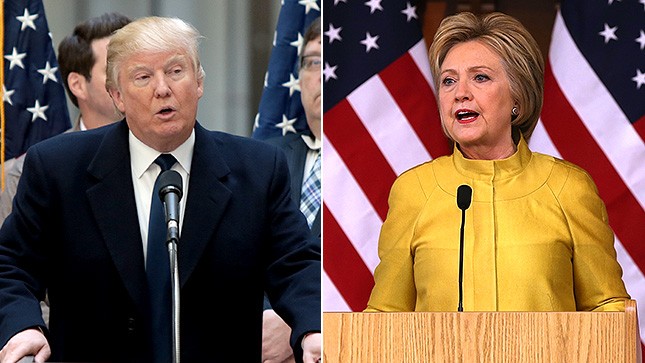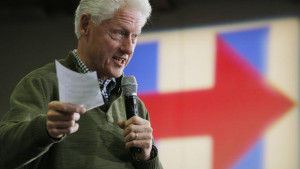
Donald Trump and Hillary Clinton have become their parties’ presidential front-runners with diametrically opposed campaign organizations. Trump has been getting by with an unconventional operation and very little investment in technology or polling or staff — though he has recently hired some seasoned political operatives to avoid getting outfoxed by Sen. Ted Cruz (Texas) at a possibly contested Republican National Convention.
And Clinton’s campaign organization could not be more different, an analysis of Federal Election Commission (FEC) spending data by The Hill reveals. The Democratic front-runner relies on an army of consultants, has a payroll more than four times the size of Trump’s and has put many millions of dollars more toward expenses traditionally associated with leading presidential campaigns.
Side-by-side, the contrasts between the Trump and Clinton campaign operations are stunning.
Aided by an estimated $2 billion in free airtime from media coverage, Trump’s campaign spent just $33.4 million through the end of February, $24 million of which Trump loaned himself. Clinton’s campaign, on the other hand, spent $129 million through the same period.
During the month of February, Clinton had 783 employees on her payroll, and Trump had 139.
Clinton employs a roster of the biggest names in Democratic politics, including campaign chairman John Podesta; foreign policy adviser Jake Sullivan; press liaisons Brian Fallon and Jennifer Palmieri; and President Obama’s longtime chief pollster, Joel Benenson.
Trump, by contrast, employs a team of previously little-known operatives led by his campaign manager, Corey Lewandowski, who has no experience running presidential campaigns and used to work for Americans for Prosperity.
That difference shows up in the bottom line, where Clinton’s spending on her staff during February alone — the most recent figures provided by the FEC — was $2.9 million, nearly as much as Trump has spent on staff since he entered the race in June.
The press teams, too, reflect the overall contrast between the campaigns.
Fallon, Clinton’s press secretary, was previously a spokesman for Sen. Charles Schumer (D-N.Y.) and former Attorney General Eric Holder, and under Fallon is a team experienced in politics.
Trump’s press operation revolves largely around one woman: Hope Hicks, a former Ralph Lauren model who arrived with only a few years of experience in corporate PR. The billionaire’s most visible on-air spokeswoman is Katrina Pierson, a Texas Tea Party activist with a penchant for controversial statements and little experience in professional politics.
“If you’re not going to have many people, you need to have really good people,” said Stuart Stevens, chief strategist for 2012 Republican presidential nominee Mitt Romney. “And Trump has hired, until recently, a bunch of people who would never have been hired to do what they’re doing by a campaign that was sane.”
But Stevens says Trump’s recent move to hire more experienced staffers is an encouraging sign for supporters, as the race appears likely to be decided by a battle for delegates at the party’s July convention in Cleveland.
The hire of GOP powerhouse Paul Manafort as convention manager drew wide praise, and Stevens described the operative as a “big, big talent.” A veteran of Republican campaigns going back to his work for President Gerald Ford at the contested 1976 GOP convention, Manafort, in an appearance Sunday on NBC News’s “Meet the Press,” described his appointment as “a natural transition” for the campaign.
“Trump was doing very well on a model that made sense, but now, as the campaign has gotten to the end stages, a more traditional campaign has to take place,” Manafort said.
But Trump’s shift comes late in the process and weeks after Cruz and his nationwide ground operation began outflanking Trump’s team by wooing delegates at conventions in North Dakota and Colorado.
If Trump is the nominee, he’ll also need to catch up to Clinton on technology and data if he is to optimize his general election chances.
The Hill’s comparison of Trump’s and Clinton’s spending on technology reveals that Clinton is running a campaign that builds on Obama’s legacy of investing in tech, while Trump’s operation is a shoestring affair.
Both candidates outsource their tech spending, but Trump is using lesser-known firms.
Trump paid more than $500,000 to Giles-Parscale, a San Antonio-based company that, according to its website, has more experience working for restaurants and real estate firms than for political campaigns.
While Trump spent just $1.1 million on technology and data, Clinton’s campaign spent close to $5 million through the end of February, with that money going to cloud computing resources and consultants who help clients deal with marketing data, suggesting a robust analytics and voter targeting operation.
On just about every other category of spending, Trump has invested significantly less than Clinton.
Using his tabloid instincts, Trump has exploited free media coverage and spent less than a third of what Clinton has on advertising. He’s also been relying on his instincts for his message, spending just $270,000 on research and polling, compared with Clinton’s $3.8 million.
And a look through the two campaigns’ rental bills suggests that Clinton has a much larger ground game. She has offices in 28 states, whereas Trump’s campaign has had a presence, as well as many fewer offices, in 15 states. More than half of Trump’s rental payments have been going to Trump-owned properties, including Trump Tower in New York, which houses the campaign’s headquarters. There are only a few categories of spending in which Trump rivals Clinton. One is on private security — each candidate has spent roughly $260,000 on security services — though Trump’s force has dealt with protesters in sometimes-controversial ways.
Another is on private air travel, each spending more than $3 million. Because Trump rides on his own jet, all of the billionaire’s expenditures on private air travel have been recycled back into the aviation company he owns, Tag Air, Inc. The only category in which Trump’s campaign spending exceeds Clinton’s is on merchandise. Trump has spent $3.3 million to Clinton’s $1.3 million, and about a third of Trump’s appears to have been on his “Make America Great Again” baseball caps, according to the FEC reports. Veteran Democratic campaign strategist Joe Trippi said Clinton’s much heavier early investment in all aspects of her campaign would give her a “tremendous” general election edge against Trump.
“Everything that she’s built is a huge, huge advantage over a Trump candidacy, because he has no data,” Trippi told The Hill. “He’s got whatever data the RNC [Republican National Committee] has, assuming he’s the nominee. And he’s got to put the fundraising together.” While Trump has made no effort to court the GOP donor class so far and has made his self-funding a point of pride in his campaign, he has left himself open to the possibility of accepting money from donors for a general election that will likely cost each candidate more than $1 billion. Lewandowski declined to comment for this story. But Trippi, asked to characterize the Trump campaign operation from what he knows, said: “Up to now, it’s a guy on a surfboard riding a wave. … The problem is if the wave starts to break up.”


